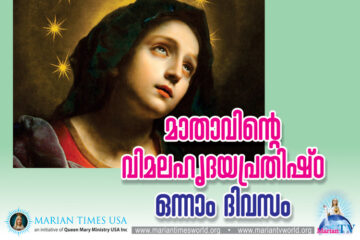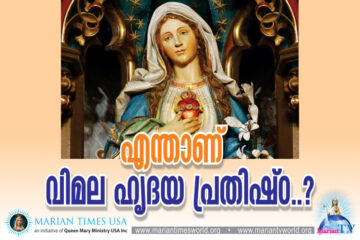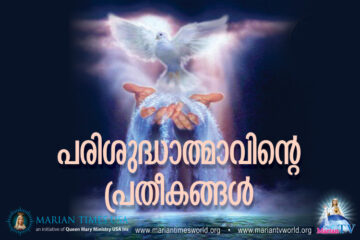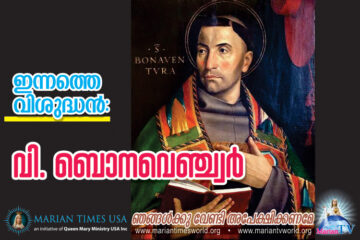THE DESCENT OF THE HOLY SPIRIT
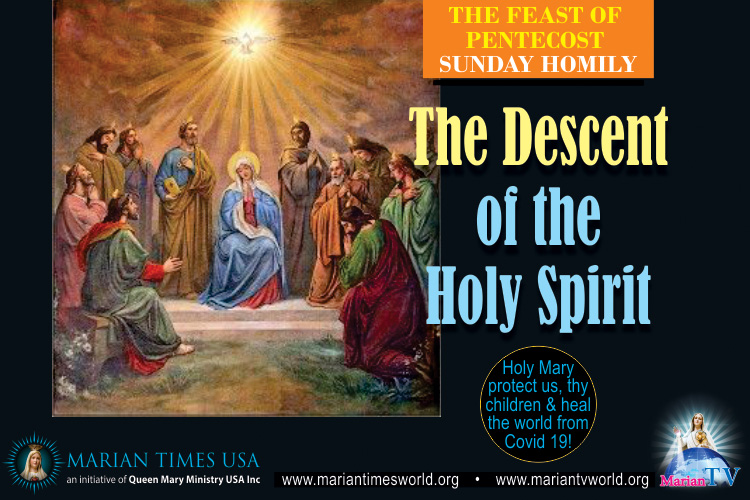
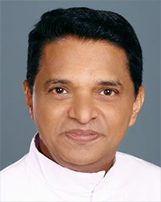
~ Fr. Abraham Mutholath ~
Chicago, USA. ~
SUNDAY HOMILY: THE FEAST OF PENTECOST
The feast of Pentecost is the annual celebration of the descent of the Holy Spirit on the apostles and the inauguration of the Church. God selected the Jewish feast of Pentecost, the agricultural feast of the weeks, to initiate the harvest of Jesus’s ministry by converting 3,000 people from all over the world to the church that already had 120 Christians gathered in Jerusalem. This feast also reminds us of the Old Testament covenant God made with Israel on Mount Sinai on the 50th day after the first historical Passover in Egypt. The new covenant established by Jesus at the last supper was confirmed by the coming of the Holy Spirit to dwell in the hearts of Christian believers. With the gifts of the Holy Spirit we, who are baptized and confirmed, are supposed to continue the mission of Jesus in this world.
Bible Text
The Coming of the Spirit.
(1) When the time for Pentecost was fulfilled, they were all in one place together. (2) And suddenly there came from the sky a noise like a strong driving wind, and it filled the entire house in which they were. (3) Then there appeared to them tongues as of fire, which parted and came to rest on each one of them. (4) And they were all filled with the holy Spirit and began to speak in different tongues, as the Spirit enabled them to proclaim. (5) Now there were devout Jews from every nation under heaven staying in Jerusalem. (6) At this sound, they gathered in a large crowd, but they were confused because each one heard them speaking in his own language. (7) They were astounded, and in amazement they asked, “Are not all these people who are speaking Galileans? (8) Then how does each of us hear them in his own native language? (9) We are Parthians, Medes, and Elamites, inhabitants of Mesopotamia, Judea and Cappadocia, Pontus and Asia, (10) Phrygia and Pamphylia, Egypt and the districts of Libya near Cyrene, as well as travelers from Rome, (11) both Jews and converts to Judaism, Cretans and Arabs, yet we hear them speaking in our own tongues of the mighty acts of God.” (12) They were all astounded and bewildered, and said to one another, “What does this mean?” (13) But others said, scoffing, “They have had too much new wine.”
Interpretation
(1) When the time for Pentecost was fulfilled, they were all in one place together.
The time for Pentecost
The Israelites had mainly seven feasts which according to the calendar order were: Passover, Unleavened Bread, First-fruits, the Feast of Weeks (Pentecost), the Feast of Trumpets, the Day of Atonement, and the Feast of Booths (Tabernacles). More Jewish feasts were added later after the Babylonian exile. These feasts were communal in the sense that they brought the nation together for worship and they helped to commemorate their common origin and memorable experiences in relation to God. Out of these seven pre-exile feasts originated from God, three were pilgrimagefeasts: Passover, Shavuot (Pentecost or the Feast of Weeks) and Sukkot (the Festival of Booths). According to Deuteronomy 16:16-17, “Three times a year, then, all your males shall appear before the LORD, your God, in the place which he will choose: at the feast of Unleavened Bread, at the feast of Weeks, and at the feast of Booths. They shall not appear before the LORD empty-handed, but each with his own gift, in proportion to the blessing which the LORD, your God, has given to you.” Since they traveled to Jerusalem for these feasts, they were known as “Pilgrimage Feasts.”
The first four of the seven feasts were interrelated.
(1) The Passover
“The Passover of the LORD falls on the fourteenth day of the first month, at the evening twilight.” (Leviticus 23:5). Passover commemorated the marking with the blood of a slaughtered lamb on the door posts of the houses of Israelites to save them from the angel of death. In the New Testament, this Passover became the slaughter of Jesus, the true Lamb of God whose bloodwas marked on the cross for our redemption from the bondage of sin.
(2) The Feast of the Unleavened Bread
Immediately after Passover, the Israelites had to leave Egypt in a hurry and could not wait to leaven the bread. So,God asked Israel to celebrate the feast of the Unleavened Bread for one week to remember this historical event. “The fifteenth day of this month is the LORD’s feast of Unleavened Bread. For seven days you shall eat unleavened bread.” (Leviticus 23:6). Leaven was considered as symbol of sin. Israel had to give up all their sinful ways in Egypt and follow the Lord to the promised land.
(3) The feast of the “First Fruits”
This feast was celebrated on the day after Sabbath during the one-week feast of the Unleavened Bread. “When you come into the land which I am giving you, and reap its harvest, you shall bring the first sheaf of your harvest to the priest, who shall elevate the sheaf before the LORD that it may be acceptable on your behalf. On the day after the sabbath the priest shall do this.” (Lev. 23:10-11). This offering was the first ripe barley in the field and each Israelite presented it as a bundle to the priest who would wave it in front of the altar of the Lord. Barley was harvested first before wheat and other agricultural products.Along with sheaf of barley, they were supposed to offer a one-year old lamb and a grain offering. According to Deuteronomy 26:1-11, this offering was to acknowledge that God had delivered them from Egypt and had given them the fertile land that He had promised to the forefathers. For 40 years they had to depend on Manna and now they could cultivate and eat fresh agricultural products. The Israelites did not eat of the new harvest until the firstfruits offering had been made (Lev. 23:14).
The resurrection of Jesus happened on the feast day of the “First Fruit” because that was the first fruit of the salvific activity of God. The day of Easter was the day after the Sabbath (Sunday) during the one-week feast of the Unleavened Bread after Passover. Jesus then went to heaven, the Holy of Holies, on the 40th day after his resurrection to present his sacrificial offering as the High Priest used to do on the Day to Atonement. The Father who was well pleased and accepted the offering of the Son, sent the Holy Spirit upon the apostles to constitute the church on the 50th day after the Passover sacrifice of Jesus. This fiftieth day coincided with the 50th day celebration (Pentecost) of the Old Testament.
(4). The Feast of Pentecost
Also known as the Feast of Weeks, Pentecostwas celebrated according to the directive of God given in Leviticus 23: 15-22. From the feast of the first fruits, the Israelites must count seven full weeks and the day after that or on the 50th day, they shall observe Pentecost by wheat grain offering. It consisted of two loaves of leavened bread representing Israelites and Gentiles, a burnt offering of seven one-year old lambs, one bull and two rams followed by a sin offering of one goat and a fellowship offering of two lambs (Lev. 23: 18). Though this 50th day observance was a harvest feast of thanksgiving, it was also associated with the giving of the Ten Commandments on Mount Sinai on the 50th day after the original Passover in Egypt.
There is parallelism between the 50th day event at Mount Sinai and the Coming of the Holy Spirit on the Apostles on the 50thday after the Passover sacrifice of Jesus.
- Both the giving of the commandment on Mount Sinai and the descent of the Holy Spirit on the feast of Pentecost happened on the 50th day after Passover. Israelites traveled around 40 days to reach from Egypt to Mount Sinai. They left Egypt on the 15th day of the first month and arrived at the foot of Mount Sinai on the first day of the third month (Exodus 19:1). Moses went up to Mount Sinai on the 40th day to meet with God and God came down on the mountain to meet the Israelites and gave them Ten Commandments on the 50th day after Passover. Similarly, Jesus ascended to heaven on the 40th day to join with the Father, and the Holy Spirit came down on the apostles on the 50th day.
- The extraordinary signs at Mount Sinai and Mount Zion (Jerusalem) at the time of Pentecost were similar. Both happened on holy mountains selected by God. At Mount Sinai there were thunder and lightning, heavy cloud and loud blast of the shofar (Exodus 19:16). “Now Mount Sinai was completely enveloped in smoke, because the LORD had come down upon it in fire. The smoke rose from it as though from a kiln, and the whole mountain trembled violently.” (Exodus 19:18). During the Pentecost after the ascension of Jesus, there were a sudden noise from the sky like a strong driving wind, tongues of fire that rested on the apostles, and gift of speaking in different languages (Acts 2: 2-4).
- God gave the Torah on Mount Sinai as teachings for God’s chosen people. On the day of Pentecost, the Holy Spirit came as the Teacher of believers. “The Advocate, the Holy Spirit that the Father will send in my name—he will teach you everything and remind you of all that told you.” (John 14:26).
- The laws given at Mount Sinai were written on two stone tablets. The new law given at the time of Pentecost was written on the human hearts of Christians. On the Pentecost day, when people heard the preaching of Peter, “they were cut to the heart.” (Acts 2:37).
- At Mount Sinai, God came down to dwell among the people of Israel. He led them in the form of column of cloud during day and column of fire at night (Exodus 13:21-22). God dwelt with them in the Tabernacle and later in the Temple of Jerusalem. God’s presence in the Temple was lost before Babylonian exile, because of the sins of the Israelites. However, the Lord’s dwelling came back through Jesus when he was born in Bethlehem and later to the Christian hearts from the time of Pentecost. “Do you not know that you are the temple of God, and that the Spirit of God dwells in you?” (1 Cor. 3:16).
- Both events led to the formation of a newly redeemed community of God’s chosen people. The Exodus gave birth to the Israelite nation while the Pentecost inaugurated the formation of the Christian community.
- When God gave Torah to Moses on the Mountain, the people were worshiping golden calf. Because of this sin, 3,000 people were killed as punishment (Exodus 32:25-28). On the day of Pentecost, 3,000 people gained faith in Jesus and received baptism at the preaching of Peter (Acts 2:41).
They were all in one place together
Opinions differ among scholars and preachers on who are represented in the pronoun “they.” It is believed to be the twelve apostles including Mathias who was selected before the Pentecost. That is evident from Acts 2:14: “Then Peter stood up with the Eleven, raised his voice, and proclaimed to them.”Others differ based on Acts 1:15 that 120 people were present at the time of selection of Mathias. “During those days Peter stood up in the midst of the brothers (there was a group of about one hundred and twenty persons in the one place).” However, did all of them receive the Holy Spirit is not specified in the Bible. All agree that the 12 apostles were the chosen pillars of the church because Jesus selected them and commissioned them with special powers and mission.
(2) And suddenly there came from the sky a noise like a strong driving wind, and it filled the entire house in which they were.
Suddenly there came from the sky
The “sudden” noise like a wind is indicative of unnatural phenomenon because a natural wind was not expected at that time. The fact that the wind came from the sky is also indicative of an unnatural spectacle. Sky stands for heaven and so this phrase shows the descent of the Holy Spirit from heaven.
A noise like a strong driving wind
This noise reminds of the blast of the shofar that grew louder and louder when God appeared on Mount Sinai to Moses and to the people (Exodus 19:19). The wind stands for the Holy Spirit. At the time of creation, mighty wind was sweeping over the waters (Genesis 1:2). When “LORD God formed the man out of the dust of the ground and blew into his nostrils the breath of life, and the man became a living being.” (Genesis 2:7). During the feast of Pentecost, God the Holy Spirit breathed on the disciples of Jesus to gain a new life. According to John, Jesus breathed on the apostles and said to them, “Receive the holy Spirit.” (John 20:22). Hence the breath or wind of God gave the apostles a new and empowered Christian life.
It filled the entire house in which they were.
The Spirit of God that came on the apostles, filled the entire house and on all who were present there. Instead of the temple, it was in a house that the Holy Spirit came. The presence of God was starting to manifest in the church as a community of Christian believers. The power of the Holy Spirit began to work on the whole church. Though the apostles and their successors received the Holy Spirit in a special way as servants of the Word of God, all the baptized received the Holy Spirit and all have the responsibility to defend and propagate the Christian faith.
(3) Then there appeared to them tongues as of fire, which parted and came to rest on each one of them.
Tongues as of fire
God appeared in the form of fire several times in the Bible. For example, God appeared to Moses at Mount Horeb in a burning bush while he was tending the sheep of his father-in-law Jethro (Exodus 3:2). The Lord preceded the Israelites in the desert in the form of a column of fire at night (Exodus 13:21). The Lord came down upon Mount Sinai in fire (Exodus 19:18). The Holy Spirit came upon the apostles in the form of fire. At Mount Sinai, the fire was visible as one body and seen by all. The fire at Pentecost was individual pieces that rested on each of the apostles. While people kept away from fire at Mount Sinai, at Pentecost, people received the tongues of fire upon them.
Holy Spirit is represented by fire because fire has purity, light, and heat. It can purify a metal by burning away the impurities on it. The fire can also melt the metal to mold it in a desired shape. Thus, the Holy Spirit can purify us from sin and mold us as God’s instruments. The Spirit can enlighten our minds with the truths of the gospel of Jesus. It can also make us zealous to work for the Kingdom of God and to defend the Christian faith. Fire causes the rebuilding of a city or regeneration of a forest in a better form. The Holy Spirit is so powerful that it can spiritually renew a person. “The spirit of the LORD will rush upon you, and you will join them in their prophetic ecstasy and will become a changed man.” (1Samuel 10:6). The coming of the Holy Spirit reformatted the mind and spirit of the apostles.
(4) And they were all filled with the holy Spirit and began to speak in different tongues, as the Spirit enabled them to proclaim.
They were all filled with the holy Spirit
The presence of the Holy Spirit was not just a vision of flames on the apostles, but it filled their whole body. The Spirit made transformation in them.
They began to speak in different tongues
In Mark 16:17, Jesus had foretold the disciples, “And these signs will accompany those who believe: In my name they will drive out demons; they will speak in new tongues.” With the coming of the Holy Spirit, they were gifted with new languages. This can be understood in different ways: (1) They could speak with better understanding of the scripture, (2) they could speak different languages that they had not learnt before, or (3) others who did not know their language could follow what they spoke.
As the Spirit enabled them to proclaim
It was the Holy Spirit that was enabling them to proclaim the Word of God with boldness and out of conviction and knowledge of the Holy Scriptures.
(5) Now there were devout Jews from every nation under heaven staying in Jerusalem.
Because of the pilgrimage feast of Pentecost, Jews who observe the commandments of the Lord had arrived from all over the known world to worship the Lord in the Temple of Jerusalem. So, the crowd gathered at the Pentecost was representing people of all nations. According to the Biblical concept, there were 70 nations in the world deriving from the three sons of Noah. The children of Israel had scattered all over the world because of the Assyrian and Babylonian exiles.
(6) At this sound, they gathered in a large crowd, but they were confused because each one heard them speaking in his own language.
Somehow the mysterious happening in the room, where the disciples of Jesus gathered,became known to the public. It could be because of the strange and strong wind or the loud noise made by the Christians affected by the Holy Spirit. The people gathered were of different nationalities who spoke different languages and could not follow other languages. However, they felt the miracle that they all could understand what the disciples of Jesus spoke in a language foreign to them. So, the miracle was happening on the listeners as well who could understand the foreign language of the spirit-filled Christians.
This miracle was a reversal of what happened at the destruction of the Tower of Babel in Genesis 11:1-9. The people at Babel were united and spoke one language. When they tried to build the tower to compete with God, God scattered them all over the world with different languages. The descent of the Holy Spirit at the Pentecost brought together people from all nations and languages in the name of Christ. This unification of all nationalities and people of all languages all over the world has been continuing since then as one body under pope, the vicar of Christ.
(7) They were astounded, and in amazement they asked, “Are not all these people who are speaking Galileans?
The people who crucified Jesus in Jerusalem were more literate than people from Galilee, especially the disciples of Jesus. These illiterate and ordinary people were speaking the wonders of God and interpreting the Holy Scripture with great proficiency and linguistic skills. That amazed the Jewish elite in Jerusalem and the pilgrims from foreign lands.
(8) Then how does each of us hear them in his own native language? (9) We are Parthians, Medes, and Elamites, inhabitants of Mesopotamia, Judea and Cappadocia, Pontus and Asia, (10) Phrygia and Pamphylia, Egypt and the districts of Libya near Cyrene, as well as travelers from Rome, (11) both Jews and converts to Judaism, Cretans and Arabs, yet we hear them speaking in our own tongues of the mighty acts of God.” (12) They were all astounded and bewildered, and said to one another, “What does this mean?” (13) But others said, scoffing, “They have had too much new wine.”
Most people who came from foreign countries believed in what the disciples, especially Peter spoke of Jesus. They received baptism, and went to their own countries and communicated the gospel of Jesus. So, the apostles and other Christian missionaries who went all over the world to preach the gospel had some welcoming followers of Jesus in many foreign places. Those who were past opponents of Jesus and those who did not get the gift of understanding, criticized the apostles that they must be drunk to speak like that though it was around 9: A.M.
Message
- Though the Holy Spirit came on the apostles individually, it happened when they were gathered in one place as a community of prayer. Jesus promised: “For where two or three are gathered together in my name, there am I in the midst of them.” (Mathew 18:20). Along with personal prayers, we also need community worship.
- There were three pilgrimage feasts for Israelites when even those who live in faraway places had to go to the Temple to worship the Lord and bring gifts to God according to what each one had received from the Lord. They also observed other feasts and offered daily sacrifice in the morning and evening in the Temple. God invites us, who are pilgrims in this world, to attend services in the church where Jesus is present in the Holy Eucharist and where Jesus offers his sacrifice for us. Let us make use of maximum opportunity for this worship in our lifetime.
- Besides our parish churches, let our homes be also places of daily devotion. God’s presence will be there also when the family gathers in prayer in Jesus’ name.
- Besides receiving the Holy Spirit at the time of baptism, we have received the Holy Spirit through the Sacrament of Confirmation (Chrismation). This sacrament strengthened us to defend our faith and to propagate the Christ’s message of salvation. Let us keep up our faith in this secularized society, teach religion to our children, give witness to the Lord in every possible way, and support Catholic missionaries who serve on behalf of us and the Lord in various parts of the world.
- A reflective reading of the Holy Bible and Biblical interpretations can help us enlighten our minds, enjoy the Word of God and build up our personality according to the gospel.
- There is only one language that all people all over the world, regardless of age and diversity, understand; and that is love. As part of the observance of Pentecost, God commanded: “When you reap the harvest of your land, you shall not be so thorough that you reap the field to its very edge, nor shall you gather the gleanings of your harvest. These things you shall leave for the poor and the alien. I, the LORD, am your God.” (Lev. 23:22). Let us not forget that what God gives us is not just for our personal use, but to share with others out of love towards God and humanity. Such sharing is part of evangelization and thelonging for sharing is a gift of the Holy Spirit.
മരിയന് ടൈംസിലെ ഇന്നത്തെ പ്രധാനപ്പെട്ട അപ്ഡേറ്റുകള് താഴെ ലഭിക്കുന്നതാണ്.


